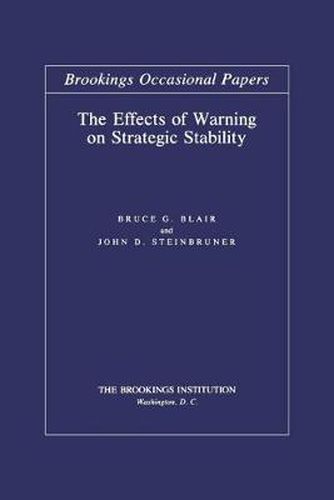Readings Newsletter
Become a Readings Member to make your shopping experience even easier.
Sign in or sign up for free!
You’re not far away from qualifying for FREE standard shipping within Australia
You’ve qualified for FREE standard shipping within Australia
The cart is loading…






Among its many important effects, the political revolution in central Europe has provided a sharp reminder that international security is as much a state of mind as it is a physical condition. The threat of a Soviet invasion of Western Europe, long hypothesized by Western defense ministries on the basis of a perceived imbalance in inherent conventional force capability, is now acknowledged to be a practical impossibility because shifts in political alignment have been credited. In the wake of that judgement, the force deployments themselves are virtually certain to be reduced, equalized, and disengaged, thereby removing firepower advantage as a threat to international stability. Moreover, though the intrinsic connection is remote, a similar judgement seems to be affecting global strategic deployments. As strategic forces are projected to be reduced to common ceilings by mutual agreement, the fear of preemptive attacks on theoretically vulnerable land-based installations appears to be receding more rapidly than the inherent capability that originally inspired it.This relief from the narrowly focused, obsessive fears that have dominated U.S. security policy for several decades is certainly a constructive development, but unfortunately it is not comprehensively valid. For strategic forces in particular, some subtle interaction between human judgement and physical capability remain potentially dangerous, presenting a security problem that will not be resolved simply by completing the projected agenda of national weapons development and international arms control agreements. The problem arises from conceivable combinations of events that are undoubtedly improbable but unprecedentedly catastrophic should any of them ever occur. The standards of safety that have evolved for improbable disasters of much smaller magnitude nuclear reactor meltdown, for example have been applied to only peacetime operations and have not been extended to the circumstances of advanced crisis or to the actual implications of combat operations. To appreciate the implications of this limitation and the dangers that emerge from it requires a substantial revision of standard perspectives on strategic security.
$9.00 standard shipping within Australia
FREE standard shipping within Australia for orders over $100.00
Express & International shipping calculated at checkout
Among its many important effects, the political revolution in central Europe has provided a sharp reminder that international security is as much a state of mind as it is a physical condition. The threat of a Soviet invasion of Western Europe, long hypothesized by Western defense ministries on the basis of a perceived imbalance in inherent conventional force capability, is now acknowledged to be a practical impossibility because shifts in political alignment have been credited. In the wake of that judgement, the force deployments themselves are virtually certain to be reduced, equalized, and disengaged, thereby removing firepower advantage as a threat to international stability. Moreover, though the intrinsic connection is remote, a similar judgement seems to be affecting global strategic deployments. As strategic forces are projected to be reduced to common ceilings by mutual agreement, the fear of preemptive attacks on theoretically vulnerable land-based installations appears to be receding more rapidly than the inherent capability that originally inspired it.This relief from the narrowly focused, obsessive fears that have dominated U.S. security policy for several decades is certainly a constructive development, but unfortunately it is not comprehensively valid. For strategic forces in particular, some subtle interaction between human judgement and physical capability remain potentially dangerous, presenting a security problem that will not be resolved simply by completing the projected agenda of national weapons development and international arms control agreements. The problem arises from conceivable combinations of events that are undoubtedly improbable but unprecedentedly catastrophic should any of them ever occur. The standards of safety that have evolved for improbable disasters of much smaller magnitude nuclear reactor meltdown, for example have been applied to only peacetime operations and have not been extended to the circumstances of advanced crisis or to the actual implications of combat operations. To appreciate the implications of this limitation and the dangers that emerge from it requires a substantial revision of standard perspectives on strategic security.